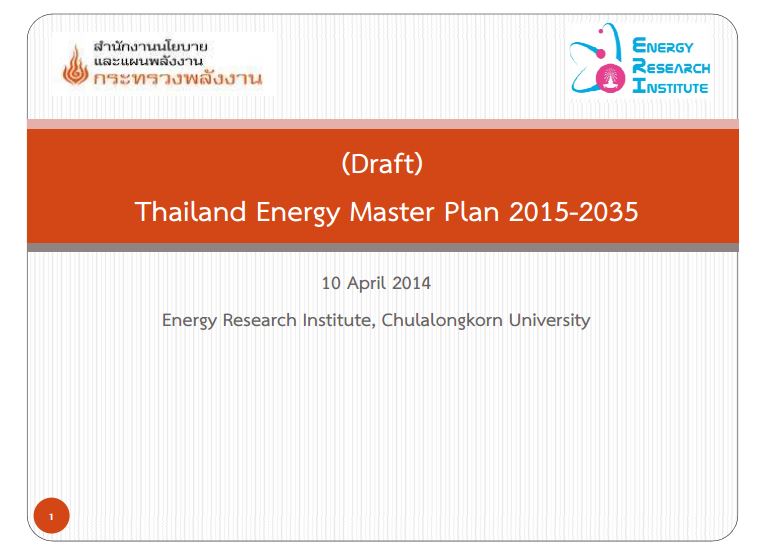
- This event has passed.
Workshop on Thailand Energy Roadmap 2015-2035
April 10, 2014

Dear Colleagues,
Thailand’s demand for final energy will double within the next 25 years if consumption continues at the current rate, and with its limited resources, the Kingdom will likely remain a net energy importer to meet its increasing demands, according to a forecast by the Asia Pacific Energy Research Center.
“Final energy” is that available to the user after conversion from primary energy sources such as petroleum, nuclear, wind or the sun. Electricity is a form of final energy.
“A large percentage of ‘other’ sector demand will be for electricity in the commercial sub-sector and for oil in the agricultural sub-sector,” the report said. “The likely increase in home-appliance ownership, and its impact on residential demand, varies between types of home appliance. In 2010, air-conditioners were owned by only 15.6 per cent of the households, which is a long way below saturation level. In comparison, television and fan ownership levels are much higher: 96 per cent of households own a television and 97 per cent own fans.”
In 2035, industrial and non-energy-sector use together will account for 48 per cent of the total final energy demand, while transport will account for 27 per cent and “other” sector demand for 25 per cent.
Agenda
- 10.00 – 11.00 Presentation on Thailand Energy Roadmap 2015–2035
- 11.00 – 12.00 Q & A and Discussion
- 12.00 Light Lunch
Thailand’s energy conservation and efficiency campaign through various measures, including building codes and minimum efficiency performance standards for appliances, is expected to moderate electricity demand in this sector.
The domestic transport sector’s energy demand will be affected by increasing vehicle numbers (which are still far below saturation level) and the increase in vehicle-kilometres travelled. Demand will be moderated by the gradual shift in transport modes in urban centres (to rapid-transit systems) and a modest increase in the use of biofuels and alternative vehicles.
The light-vehicle fleet in Thailand will be more diverse by 2035. Hybrids and plug-in vehicles will account for 4 per cent of the fleet, while autos running on liquefied petroleum gas and natural gas for vehicles will account for 7 per cent.
TEBA members are invited to share the latest findings and provide recommendations to Energy Policy and Planning Office of Ministry of Energy and Energy Research Institute of Chulalongkorn University as they are currently drafting Thailand’s 20-year Energy roadmap (2015-2035).
